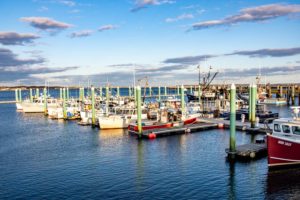PROVINCETOWN — In the wake of unpopular fee hikes by the board of the Provincetown Public Pier Corp., which manages MacMillan Pier, two members of that board have been forced to resign after a fisherman’s attorney called them out for exceeding term limits.
Ginny Binder, the chair, and member Carlos Verde both resigned in the last few weeks after William Henchy, the attorney for fisherman David Flattery, complained that they had stayed on the board for more than two consecutive terms. The term limit is set forth in the legislation that created the Pier Corp., a little understood group of volunteers tasked with managing the town’s most important waterfront facility.
The shake-up comes less than a month after users of MacMillan Pier expressed outrage over a doubling of their fees for docking at the pier. In reaction, officials are calling for ways to discuss how the pier can be managed more effectively in general.
Verde and Binder have been on the Pier Corp. board for 10 years. Both were starting their third five-year terms.
A third Pier Corp. board member, LeRoy “Scott” Fraser, will come to the end of his second consecutive term in July.
Six people have applied to replace the departing board members, including David Young, an Eastham lobsterman; Laura Ludwig, a member of the harbor committee; Caitlin Townsend, a Truro resident and a senior at the Mass. Maritime Academy; and Barbara Dyett, who lives part-time in New Jersey and maintains a rented home here. The select board interviewed them on March 8. Two more applicants are also awaiting interviews. Only Ludwig is a Provincetown voter. But the Pier Corp. board can include nonresidents.
This personnel change comes at a contentious time. On Feb. 15, the board adopted several rule changes and fee hikes. Every select board meeting since then has been dominated by people complaining about the fees. One select board member, Lise King, has said the economic hit from the Covid-19 pandemic makes it the wrong time to raise costs for fishermen.
Robert Anthony, another select board member, said the town needs to look at what has happened to MacMillan Pier over the last 20 years and how it can be managed better.

Bill Dougal was chair of the finance committee 20 years ago when the Mass. Port Authority told Provincetown officials there was millions of dollars in state and federal grant money available to rehabilitate commercial fishing piers. But in order to take advantage of $13.8 million in grants, the state required the town to create the Public Pier Corp., a separate governing body.
The state wanted a management board “because they had no confidence the town could run the pier any longer,” Dougal said.
The pier was substantially renovated with the grants. Dougal said the state put together comparable market-rate fees to maintain the reconstructed pier. But these fees “were beyond what the users could ever support,” Dougal said. For years, the Pier Corp., the users, and the select board engaged in finger pointing in all directions, Dougal said. And so, even after the infusion of the $13.8 million, the pier has deteriorated. For example, the mechanism to heat water has failed. In order to keep from freezing, water must be left running, not dripping, Fraser said, with fresh water pouring into the harbor.
“It has always been underfunded and it’s been unfair to the Pier Corp. and the users as well,” Dougal said. “It’s time to step back and look at how we got here and what’s needed for re-investment for the future.”
Verde said the Pier Corp. has always been left to do the select board’s “dirty work,” that is, making unpopular decisions to keep the pier maintained and solvent.
In reality, the fees are below market for a pier that offers ice, cranes for off-loading, parking, and electrical service, Verde said.
Fraser said the increased fees for large fishing vessels on the fixed finger piers are less than Gloucester’s fees. They are the same as New Bedford’s current rate, but New Bedford doesn’t reserve dock spaces, so users never know where they can dock, and often must tie up to other vessels. Each slip in Provincetown is reserved. The marina in Sandwich charges less than Provincetown’s new rates, but there is a two-year wait list for large vessels, Fraser said.
Beau Gribbin, a fisherman, told the select board even the large fee increases aren’t enough to correct the problems at the pier.
“You guys are about to embark on a difficult task to fill the holes, and I hope you devise a plan for better management,” Gribbin said.
Editor’s note: Because of a reporting error, an earlier version of this article stated incorrectly that Barbara Dyett of New Jersey, a candidate for the Pier Corp. board, owns a second home here. She is a year-round renter.



